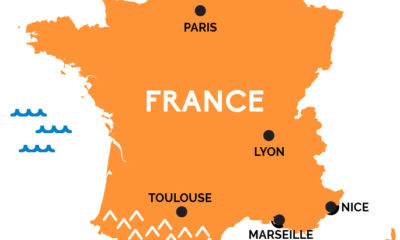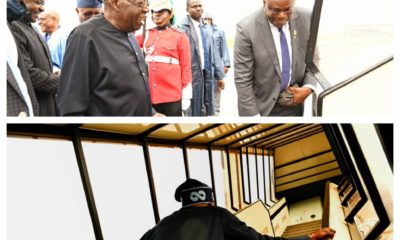International News
France Passes Bill Allowing Remote Phone Surveillance

The French government has successfully passed a bill that grants police authorities the ability to conduct remote surveillance on individuals by activating various features of their mobile phones, including cameras, microphones, and GPS.
This bill extends the scope of geolocation tracking to cover suspects of criminal activities, encompassing additional devices such as laptops, vehicles, and connected devices.
The surveillance measures outlined in the bill also enable law enforcement agencies to remotely activate recording functionalities to capture audio and visual evidence related to suspected cases of terrorism, organized crime, and delinquency.
However, the inclusion of these surveillance provisions within the broader “justice reform bill” has sparked criticism from both the political left and rights advocates, who argue that it represents an overreach of state power and an encroachment on individual privacy rights.
Detractors of the bill have labeled it as an authoritarian “snoopers’ charter,” expressing concerns about potential abuses and violations of civil liberties.
The provisions outlined in the surveillance bill passed have raised significant concerns regarding the potential infringement of fundamental liberties, according to La Quadrature du Net, a prominent advocacy group promoting digital rights and freedoms.
The group has specifically pointed out that these provisions pose a threat to the rights of security, privacy, private correspondence, and freedom of movement.
They have criticized the proposal as a step towards an overly heavy-handed approach to security.
But lawmakers agreed to the bill late Wednesday as Justice Minister Eric Dupond-Moretti insisted the bill would affect only “dozens of cases a year.”
During the parliamentary debate on Wednesday, lawmakers aligned with President Emmanuel Macron introduced an amendment to the surveillance bill, which seeks to restrict the use of remote spying to specific circumstances.
According to the amendment, remote surveillance would only be permitted when deemed necessary due to the nature and severity of the crime at hand, and the duration of such surveillance would be strictly proportional to the situation.
Additionally, the provision requires judicial approval for its implementation, with the total duration of surveillance limited to a maximum of six months.
Furthermore, the amendment explicitly excludes certain professions from being legitimate targets of remote spying. Individuals in sensitive roles, including doctors, journalists, lawyers, judges, and members of parliament, would be protected under the revised legislation.
Last month, the French Senate granted approval to a provision within the justice bill, which grants law enforcement authorities the ability to covertly activate cameras and microphones on devices belonging to suspects.
This provision represents an expansion of France’s surveillance capabilities, which have been steadily increasing since the wave of terrorist attacks in 2015.
The bill, commonly referred to as the “Keeper of the Seal” bill, has drawn comparisons to the controversial U.S. Patriot Act due to its perceived similarities in terms of surveillance powers.
International News
ICC Issues Arrest Warrants For Israeli Prime Minister Netanyahu, Others
The International Criminal Court (ICC) has taken a historic step, issuing arrest warrants for Israeli Prime Minister Benjamin Netanyahu and former Defense Minister Yoav Gallant.
The charges include crimes against humanity and war crimes allegedly committed during Israel’s recent assault on Gaza.
In a detailed statement, the ICC accused the Israeli leaders of “intentionally and knowingly depriving the civilian population in Gaza of objects indispensable to their survival, including food, water, and medicine and medical supplies, as well as fuel and electricity.”
READ MORE: Osun Govt Decries Attempted Murder Of Park Mgt Chairman By Police
The ICC’s move marks a significant escalation in international scrutiny of the Israeli-Palestinian conflict. Netanyahu and Gallant are alleged to have orchestrated policies that caused severe harm to the civilian population in Gaza, leading to widespread condemnation from human rights organizations.
Alongside the charges against Israeli officials, the ICC also issued an arrest warrant for Hamas military commander Mohammed Deif. Deif has long been a central figure in Hamas’s military operations. Israel’s military claims to have killed him in a July airstrike, although this has not been independently verified.
The warrants highlight growing calls for accountability amid the ongoing conflict in the region. The ICC’s actions are likely to provoke heated debate and may complicate diplomatic efforts aimed at resolving the crisis.
With the warrants issued, global attention now turns to how the international community will respond and whether any practical steps will be taken to enforce them.
International News
COP29: Climate Summit Faces Deadlock Over Vague Funding Proposals For Vulnerable Nations
As the 29th United Nations Climate Change Summit (COP29) nears its conclusion, tensions are rising over a newly published funding proposal aimed at assisting developing nations in addressing climate-induced crises.
The proposal, released by the United Nations Framework Convention on Climate Change (UNFCCC) on Thursday, has sparked widespread debate among delegations, activists, and observers at the summit.
The document, spanning ten pages, outlines funding options to support developing countries in implementing their Nationally Determined Contributions (NDCs) under the 2015 Paris Agreement.
READ ALSO: Osun Explains N75,000 New Minimum Wage
However, it fails to specify how much wealthier nations are required to contribute annually—a key sticking point that has drawn criticism from the Global South and climate advocates.
Ambiguity in Funding Commitments
Critics argue that the absence of concrete figures undermines the credibility of the proposed framework.
Mohamed Adow, Founder and Director of Power Shift Africa, described the proposal as “a blank piece of paper,” highlighting the lack of clarity on financial commitments.
“This is the ‘finance COP.’ We came here to talk about money. The way you measure money is with numbers. We need a cheque, but all we have right now is a blank piece of paper,” Adow remarked during an interview.
The Global South, led by African delegations, is demanding at least $1.3 trillion annually by the end of the decade to adapt to climate change impacts and transition to sustainable energy systems.
Yet, developed nations have yet to commit to a specific annual figure, raising concerns over the summit’s ability to deliver tangible outcomes.
Key Provisions and Concerns
The new text acknowledges the disproportionate impact of climate change on developing nations and the financial barriers they face, including high costs of capital and limited fiscal space.
READ ALSO: NNPCL Launches Utapate Crude Oil Blend, Eyes Production Expansion In 2025
It proposes the establishment of a New Collective Quantified Goal (NCQG) for climate finance, suggesting a framework of “at least USD [X] trillion annually” from 2025 to 2035.
However, the absence of defined numbers has led to frustration among negotiators.
David Tong, Global Industry Campaign Manager at Oil Change International, emphasized the critical role of finance in achieving meaningful progress.
“Without finance, there is no phase-out [of fossil fuels], no energy transition, no adaptation. The ambitious options are simply missing,” Tong stated during a press briefing.
Rising Frustration from the Global South
Delegates from the Global South have expressed dissatisfaction with what they perceive as weak commitments from developed nations.
Many fear that without concrete financial pledges, the summit’s outcomes may fall short of expectations.
“This summit is about delivering justice to those who suffer most from climate impacts. Wealthy nations must step up and provide the necessary funding,” said an African negotiator, speaking on condition of anonymity.
A Critical Juncture
With less than 48 hours remaining in the summit, the stakes are high. The COP29 negotiations in Baku, dubbed the “finance COP,” are expected to set a precedent for addressing the financial needs of vulnerable nations.
Delegates are calling on world leaders to finalize an ambitious NCQG target and bridge the growing divide between developed and developing nations.
International News
Biden Approves Anti-Personnel Mines For Ukraine
In a significant policy move, U.S. President Joe Biden has authorised the transfer of anti-personnel mines to Ukraine, signaling heightened support for the country amid its ongoing struggle against Russian forces.
The decision underscores the administration’s commitment to bolstering Ukraine’s defensive capabilities as the conflict shows no signs of abating.
This announcement follows reports that Ukrainian forces have employed U.S.-supplied ATACMS missiles to conduct precision strikes within Russian territory.
These developments have reportedly prompted Russian President Vladimir Putin to modify elements of Russia’s nuclear doctrine, further intensifying global scrutiny of the conflict’s escalation.
READ MORE: Vinicius Jr. Honors Cameroonian Roots Ahead Of Brazil’s Clash With Uruguay
In addition to the mines, the U.S. is set to unveil a new $275 million military aid package for Ukraine in the coming days. The package is expected to include a range of munitions and equipment aimed at enhancing Ukraine’s operational readiness.
This move aligns with Washington’s broader strategy to maintain robust support for Kyiv, even as questions loom over potential shifts in U.S. foreign policy with the approaching transition to a new administration.
The U.S. government has remained steadfast in its support for Ukraine, with officials emphasizing that these measures are essential for helping Ukraine defend its sovereignty. The provision of anti-personnel mines, however, marks a controversial step, reflecting the urgency of the situation on the ground.
As the conflict continues, the Biden administration’s decisions will likely have profound implications not only for Ukraine but also for the broader geopolitical landscape, where tensions remain high and outcomes uncertain.














